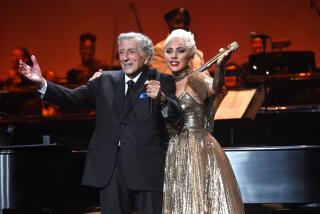**** BILLIE HOLIDAY, “The Complete Commodore Recordings,”...
- Share via
**** BILLIE HOLIDAY, “The Complete Commodore Recordings,” GRP/Commodore
** 1/2 TONY BENNETT, “Bennett on Holiday,” Columbia
In the late ‘30s and throughout the war years, Billie Holiday was at her creative peak. By 1939, the occasional rough edges of her early career had somewhat smoothed out; by the end of the war, she was recording orchestra-heavy sessions for Decca, followed by more than a decade of uneven (although occasionally superb) outings for Verve.
From 1939 to 1944, she recorded a series of sessions for Commodore that many observers say represent the pinnacle of her career. This absolutely vital collection presents the four sessions in their entirety.
The first session, in 1939, produced “Yesterdays,” “Fine and Mellow,” “I Gotta Right to Sing the Blues” and the incomparable “Strange Fruit.” The date came about when Columbia, Holiday’s label at the time, refused to allow her to record “Strange Fruit,” with its powerful (both then and now) images of a lynching in the South.
The rest of the tracks were produced in three sessions during a two-week period in spring 1944. They include one Holiday classic after another: “How Am I to Know,” “My Old Flame,” “I Cover the Waterfront,” “He’s Funny That Way,” “Lover Come Back to Me” and “Billie’s Blues.”
Despite backgrounds that often do little more than lay down simple chording and one or two funereal tempos, Holiday produces a series of performances that are virtual definitions of jazz singing. Rhythmically articulate, always in touch with the meaning of the words, inherently emotional and personal, they are required listening for even the most casual jazz listener. And, as a bonus, there are alternate takes--some very good ones, in fact--of most of the tunes. It is, in sum, classic jazz at its very best.
*
Tony Bennett and Holiday make an unlikely combination. Although Bennett has become far more closely associated with jazz in his later years, he is at best a traditional pop artist. Unlike Holiday, who also dealt in pop-type material, he has rarely demonstrated--as she did consistently--the capacity to transform that material into the multilayered emotional and musical experience of jazz. The same is often true here, in 19 often surprisingly brief versions of numbers associated with Holiday.
But the results are more attractive than one might expect. Curiously, the better tracks are the ballads with orchestral accompaniment, rather than those accompanied by the jaunty backing of his regular band, the Ralph Sharon Trio. On songs such as “Solitude,” “She’s Funny That Way,” “My Old Flame” and emotionally rich readings of “These Foolish Things,” “Some Other Spring,” “Crazy She Calls Me” and “Good Morning, Heartache,” Bennett for once forgets the histrionics and gets into the songs, producing some of the most sensitive singing of his career.
The Sharon-accompanied pieces are less captivating. Aside from a few outstanding moments--a briskly understated romp through “What a Little Moonlight Can Do” is one--Bennett frequently falls back into the bad habits that often arise in his live performances with the trio: uncertain phrasing, musical posturing and a willingness to ignore a lyric’s meaning in search of a high note.
The album closes with a manufactured Bennett-Holiday duet on “God Bless the Child” in the style of the Nat and Natalie Cole duet on “Unforgettable.”
Although it probably will be the track that receives the most attention, it’s an unsuccessful idea that bottoms out when Bennett intrudes on this classic Holiday performance to interject, “Tell ‘em the way it is, Billie.”
Albums are rated on a scale of one star (poor), two stars (fair), three stars (good), four stars (excellent).
More to Read
The biggest entertainment stories
Get our big stories about Hollywood, film, television, music, arts, culture and more right in your inbox as soon as they publish.
You may occasionally receive promotional content from the Los Angeles Times.









